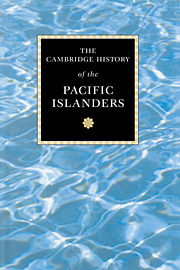Book contents
- Frontmatter
- Part One The Pacific To 1941
- Part Two The Pacific Since 1941
- 9 The War in the Pacific
- 10 A Nuclear Pacific
- 11 The Material World Remade
- 12 The Ideological World Remade
- 13 The End of Insularity
- Abbreviations
- Glossary
- Bibliography
- Index
- Map
- Map 17: Maximum expansion of Japanese control
- References
12 - The Ideological World Remade
from Part Two - The Pacific Since 1941
Published online by Cambridge University Press: 28 March 2008
- Frontmatter
- Part One The Pacific To 1941
- Part Two The Pacific Since 1941
- 9 The War in the Pacific
- 10 A Nuclear Pacific
- 11 The Material World Remade
- 12 The Ideological World Remade
- 13 The End of Insularity
- Abbreviations
- Glossary
- Bibliography
- Index
- Map
- Map 17: Maximum expansion of Japanese control
- References
Summary
CULTURES AND IDENTITIES
Central to many political and constitutional disputes in the Pacific Islands is the fact that cultural and national identities—and categories such as ‘indigenous’—are ambiguous and contested. People who once identified themselves with a tribal group, a locality, or a particular leader have been asked to accept over-arching affinities with strangers and former enemies. Particularly in Melanesia, the rhetoric of national unity is vulnerable to assertions of cultural uniqueness and the priority of local custom. Even in more homogeneous societies, national governments must contend with district and village demands for autonomy. In the post-colonial era as never before, ‘culture’ is an arena of argument. Political debate is largely about culture and the nature of indigenous institutions: whether a change has traditional precedent, or betrays tradition.
Political transformation in the Islands has been a creative, negotiated process, in which Western models of ‘kingship’, ‘nation’ and even ‘democracy’ have been refashioned. Polynesian chiefs, for example, have readily made the transition to politicians and statesmen, although the justice of their continued authority has been challenged in Fiji and Tonga. The Tongan scholar Epeli Hau’ofa argues that democratic change is inevitable. Commoners, church leaders, emigrés, and intellectuals drive the democracy movement in Tonga:
Forcing people with [these] backgrounds to remain in the ascribed subordinate place into which they were born, as some people have tried to do, is indulging in self-delusion, because that is another place, another time…
In the three remaining truly aristocratic societies of the South Pacific (Tonga, Fiji, and Samoa), Tongan chiefs have the least control of and influence on the daily life of their people. The only area where the aristocracy exerts any meaningful control at all is at the apex of the state structure. Although Tonga has an absolute monarchical form of government, its population has developed a democratic culture to the extent that commensurate changes in the political institutions are but a matter of time, because the walls of Jericho are already shaken.
Keywords
- Type
- Chapter
- Information
- The Cambridge History of the Pacific Islanders , pp. 397 - 438Publisher: Cambridge University PressPrint publication year: 1997
References
- 4
- Cited by

